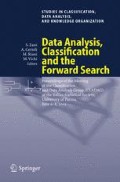Abstract
Over last few years the need for an objective way of evaluating student performance has rapidly increased due to the growing call for the evaluation of tests administered at the end of a teaching process and during the guidance phases. Performance evaluation can be achieved busing the Item Response Theory (IRT) approach. In this work we compare the performance of an IRT model defined first on a multidimensional ability space and then on a unidimensional one. The aim of the comparison is to assess the results obtained in the two situations through a simulation study in terms of student classification based on ability estimates. The comparison is made using the two-parameter model defined within the more general framework of the Generalized Linear Latent Variable Models (GLLVM) since it allows the inclusion of more than one ability (latent variables). The simulation highlights that the importance of the dimensionality of the ability space increases when the number of items referring to more than one ability increases.
Access this chapter
Tax calculation will be finalised at checkout
Purchases are for personal use only
Preview
Unable to display preview. Download preview PDF.
References
BARTHOLOMEW, D. and KNOTT, M. (1999): Latent Variable Models and Factor Analysis. Kendall’s Library of statistics, London.
CAGNONE, S. MIGNANI, S. RICCI, R. CASADEI, G. and RICCUCCI, S. (2005): Computer-Automated Testing: an evaluation of undergraduate student performance. In: Courtiat, J.P., Davarakis, C. and Villemur, T. (Eds.): Technology Enhanced Learning. Springer, Berlin, 59–68.
CAGNONE, S. and RICCI, R. (2005): Student Ability Assessment based on two IRT Models. Metodoloski Sveski, 65, 391–411.
LORD, F.M. and NOVICK, M.E. (1968): Statistical theories of mental test scores. Addison-Wesley Publishing Co., New York.
MIGNANI, S. CAGNONE, S. CASADEI, G. and CARBONARO, A. (2005): An item response theory model for students ability evaluation using computer-automated test results. In: M. Vichi, P. Monari, S. Mignani and A. Montanari (Eds.): Studies Classification, Data Analysis and Knowledge organization. Springer, Berlin, 322–332.
MOUSTAKI, I. and KNOTT, M. (2000): Generalized latent trait models. Psychometrika, 65, 391–411.
RECKASE, M. D (1997): A Linear Logistic; Multidimensional Model for Dichotomous Item Response Data. In: Van der Linden, W. J. and Hambleton, R.K. (Eds.): Handbook of Modern Item, Response Theory. Springer-Verlag, New York, 271–286.
VAN der LINDEN, W.J. and HAMBLETON, R.K. (1997): Handbook of Modern Item Response Theory. Springer-Verlag, New York.
Author information
Authors and Affiliations
Editor information
Editors and Affiliations
Rights and permissions
Copyright information
© 2006 Springer-Verlag Heidelberg
About this paper
Cite this paper
Mignani, S., Monari, P., Cagnone, S., Ricci, R. (2006). Multidimensional Versus Unidimensional Models for Ability Testing. In: Zani, S., Cerioli, A., Riani, M., Vichi, M. (eds) Data Analysis, Classification and the Forward Search. Studies in Classification, Data Analysis, and Knowledge Organization. Springer, Berlin, Heidelberg. https://doi.org/10.1007/3-540-35978-8_38
Download citation
DOI: https://doi.org/10.1007/3-540-35978-8_38
Publisher Name: Springer, Berlin, Heidelberg
Print ISBN: 978-3-540-35977-7
Online ISBN: 978-3-540-35978-4
eBook Packages: Mathematics and StatisticsMathematics and Statistics (R0)

